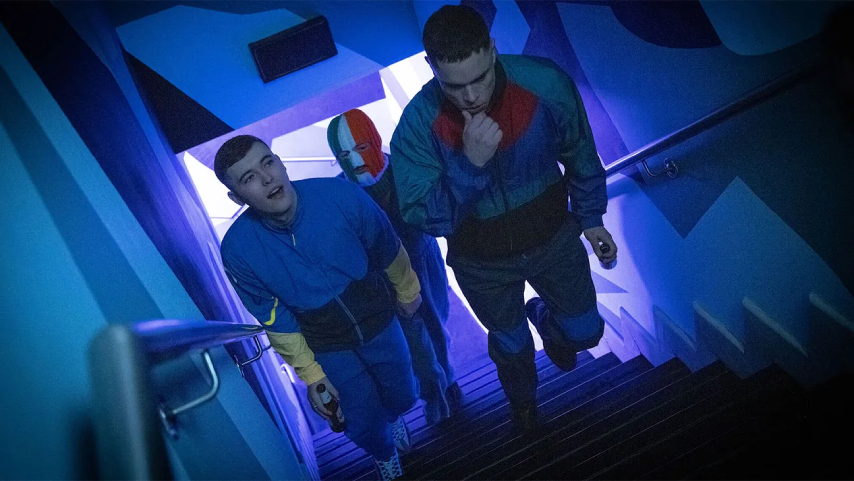Rowdy Irish rap biopic Kneecap can’t hang for the long haul
Politics and partying are fused by a common tongue in a film that quickly runs out of juice.
Photo: Sony Pictures Classics
Speaking Irish is politicized, and a relative rarity. Rapping in Irish is even more rare, and even more political, especially in the North, where you’re as likely to run into a “You live here, speak English” conservative as at a Trump rally. So when the three knuckleheads of Kneecap tell unionist politicians to fuck off in the same breath as they wax ridiculous about popping molly, the politics and partying are connected—fused by a common tongue rebelling against stiff Brit imperialists. The most impressive thing about Kneecap, the quasi-biopic fictionalizing the Belfast trio’s formation, is how it draws implied parallels between the oppression facing Irish republicans and the systemic abuses that’ve long left Black musicians telling their listeners, in one form or another, to fight the power. But writer/director Rich Peppiatt’s film has a harder time connecting its stylish music video silliness with drama that meanders and a political message that repeats like it’s stuck on a cheap turntable.
This isn’t the fault of the tracksuited musicians—Mo Chara (AKA Liam Óg Ó Hannaidh), Móglaí Bap (AKA Naoise Ó Cairealláin), and the Irish flag balaclava-wearing DJ Próvaí (AKA JJ Ó Dochartaigh)—who play heightened versions of the themselves in the film. The former two are the hedonistic bad boys, the drug-dealing faces of the group. The latter beatmaster is a former Irish-language teacher. They link up after the film’s best scene, which involves cleverly erecting a language barrier between the Irish-speakers and the English-only cops. All three are perhaps better actors than rappers, smarmy and charismatic, and perhaps I only say that because when Kneecap takes a break to turn into a music video for one of their songs, it’s when it feels most generic.
We’ve seen plenty of lower-class U.K. rabblerousers getting by on talking big, cracking wise, and pounding Class A substances in the recent class comedies Get Duked! and Scrapper; the harder-edged subplots of John Carney movies observe similar characters using music as an outlet over in Ireland. Kneecap is raunchier and more pleased with itself, a good-vibes Trainspotting; it’s taking ketamine on the bus and breaking the fourth wall to fast-forward through sequences where the band members are getting their asses kicked by local paramilitants. Finally hearing a song from the film’s burgeoning performers should feel triumphant in the context of the defiant film, but when the club-ready, grime-adjacent tracks start, the anarchic tone ironically buttons up and settles down.
Kneecap kicks off with a bang and only whimpers from there, quickly slipping out of Peppiatt’s hands. A parade of lens changes, funny camera positions, comic book motion lines, and on-screen illustrations amp things up, but they peter out quickly—it’s a hard-partying movie that can’t hang for the long haul. Peppiatt’s mostly done nonfiction so far, breaking out with the tabloid doc One Rogue Reporter, and his bag of tricks is shallow. Kneecap is his first fiction feature, which he built up to by directing the group’s simplistic, confessional-set music video for “Guilty Conscience.”
 Keep scrolling for more great stories.
Keep scrolling for more great stories.
